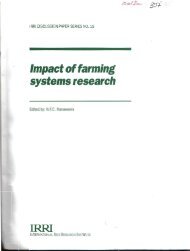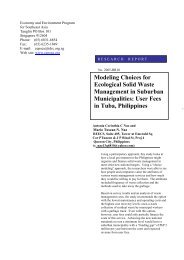Exotic Aquatic Organisms - International Development Research ...
Exotic Aquatic Organisms - International Development Research ...
Exotic Aquatic Organisms - International Development Research ...
Create successful ePaper yourself
Turn your PDF publications into a flip-book with our unique Google optimized e-Paper software.
128<br />
The <strong>International</strong> Obligations of Australia<br />
The Convention on <strong>International</strong> Trade in Endangered Species of Wild Fauna and Flora<br />
(CITES) is probably the most important international agreement protecting endangered species<br />
of plants and animals.<br />
The governments of ninety three countries, including Australia, have now signed CITES.<br />
Through CITES, these countries are trying to establish a worldwide network of controls on trade<br />
in endangered species and species that could become endangered.<br />
Within the member countries of CITES, Australia stands to the fore in providing protection<br />
of its native animals and plants, in particular those that are endangered.<br />
The Convention on Wetlands of <strong>International</strong> Importance Especially as Waterfowl Habitat<br />
(Ramsar Convention) aims to promote the conservation of wetlands and waterfowl, to establish<br />
nature reserves on wetlands and provide adequately for their protection and wardening and to<br />
promote training of personnel competent in the fields of wetlands research, management and<br />
wardening. In addition, it aims to increase, through management, waterfowl populations on<br />
appropriate wetlands.<br />
Australia signed the Convention without reservation as to ratification in 1974 and became<br />
the first country to do so. The agreement came into force internationally on 21 December 1975.<br />
Regulations to implement this Convention in Australia were not needed since the<br />
Convention imposes responsibilities which may be met either administratively or by action under<br />
existing legislation.<br />
A Working Group of the Council of Nature Conservation Ministers (CONCC)M) has been<br />
established to advise on the implementation of the Ramsar Convention. CONCC)M has agreed<br />
that the nomination of wetlands to the List of Wetlands of <strong>International</strong> Importance is the<br />
responsibility of the individual States and the Northern Territory. The Australian National Parks<br />
and Wildlife Service, which is the principal advisor to the Commonwealth Government on<br />
national nature conservation and wildlife policies, provides the Convenor for the Working Group<br />
and co-ordinates activities under the Convention, including submission of nominations for<br />
wetlands to be added to the list (Appendix II) and the preparation of the national reports.<br />
There are two international conventions in which Australia has an interest that serve as<br />
models for regional co-operation in environmental conservation. Although there are some<br />
important differences, the two can be seen as complimentary.<br />
The Convention on Conservation of Nature in the South PacWc (Apia Convention) was<br />
adopted in 1976 but has not yet entered into force. Australia intends to accede to<br />
the Convention, which aims to take action for the conservation, utilization and<br />
development of the natural resources of the South Pacific Region. Article V,<br />
paragraph 4 states "Each contracting party shall carefully consider the<br />
consequences of the deliberate introduction into ecosystems of species which<br />
have not previously occurred therein".<br />
The Convention for the Protection of the Natural Resources and Environment of the<br />
South Pacific Region (SPREP Convention) is not yet in force. Australlia signed the<br />
Convention in 1987 but has not yet ratified it. Article 14 is concerned with<br />
Specifically Protected Areas and the Protection of Wild Flora and Fauna. It aims<br />
to "preserve depleted, threatened or endangered flora and fauna ... prohibit or

















